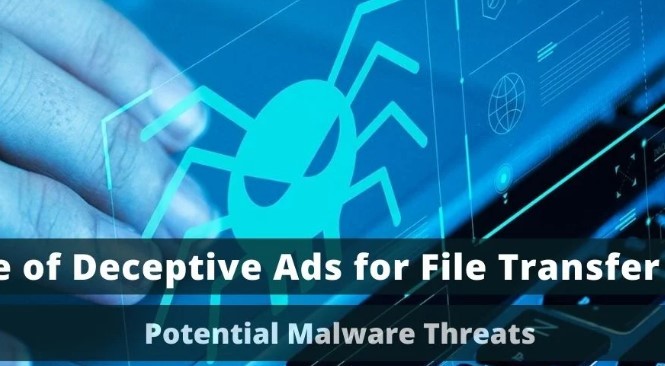
Beware of Deceptive Ads Potential Malware Threats
Experts Warn of Fake Advertisements Promoted by a Notorious Ransomware Group to Trick Users into Visiting a Fake WinSCP Website. Concerning a notorious ransomware group that actively deploys deceptive advertisements, cybersecurity experts have issued a warning. These advertisements are intended to lure unsuspecting users to fraudulent websites that imitate the official WinSCP (Windows Secure Copy) website. The ransomware group, which has garnered notoriety for its malicious activities, employs a new strategy to deceive users into falling for their schemes. By distributing phony advertisements, they hope to trick users into visiting websites that closely resemble the official WinSCP website. WinSCP, a popular Windows file transfer application, is a reliable utility for copying files securely between local and remote computers.
In a worrying development, it was discovered that the notorious cybercriminal organization Black Cat, operating under the alias ALPHV, has deployed a series of pernicious malware installers across multiple websites. These installers are intended to infect victims who access compromised websites without suspicion. According to a report by Bleeping Computer, a notorious group intends to target “system administrators, web administrators, and IT professionals” to obtain initial access to lucrative corporate networks.
Beware of Deceptive Ads Potential Malware Threats
WinSCP, an open-source client, has garnered popularity among users desiring to transfer files securely between local machines and remote servers. WinSCP’s SSH file transfer and file management capabilities have made it a popular choice among many users. The open-source nature of the client enhances its desirability, as it enables users to customize and modify the software to their specific requirements. By providing a secure and dependable platform for file transfer, WinSCP has become a valuable resource for those seeking protected and efficient data transfers. In addition to its principal capabilities, it can also serve as a WebDAV and Amazon S3 client, providing users with greater flexibility and convenience.
On Google and Bing Search Pages, Fake Ads Are Prioritised Over Legitimate Results, According to Trend Micro. In a recent discovery, the cybersecurity firm Trend Micro uncovered an alarming campaign involving phony advertisements on Google and Bing. When users searched for “WinSCP Download” on these platforms, they were directed to malicious advertisements that appeared above secure and legitimate search results, according to the company. Trend Micro, a company renowned for its proficiency in detecting online hazards, was the first to identify this alarming trend.
The cybersecurity firm observed that users browsing for the popular file transfer software WinSCP were exposed to potentially malicious advertisements instead of genuine and secure download links. The prevalence of these misleading advertisements on reputable search engines raises questions regarding the efficacy of the platforms’ ad screening processes. Due to the prominent placement of malicious advertisements, users may inadvertently click on them, putting their devices and personal information at risk. It is imperative that search engine providers address this issue immediately and enhance their ad verification mechanisms to prevent deceptive and potentially harmful advertisements from infiltrating their platforms. To avoid falling victim to these deceptive advertisements, users should exercise caution and remain vigilant while browsing, particularly when downloading software or clicking on ads.
Ad-Related Fake Websites Contain WinSCP Tutorial According to a recent discovery, a number of advertisements are directing unsuspecting users to fraudulent websites. These deceptive websites, when visited, redirect visitors to a WinSCP tutorial. WinSCP, which stands for Windows Secure Copy, is a popular file transfer protocol (FTP) client used to transmit files between a local and remote computer in a secure manner.
Nonetheless, it appears that fraudsters are exploiting this legitimate software to ensnare users into their malicious traps. The fraudulent websites, deceptively masked as legitimate sources, are deceptive. Google has recently discovered that certain websites employ deceptive advertisements to avoid detection. Although these websites may not pose an imminent threat, they do redirect unsuspecting visitors to fake versions of legitimate websites. One such example is the WinSCP website, which uses fraudulent domains such as winsccp[.]com as opposed to the genuine winscp.net.
In a disturbing development, it has been discovered that numerous fraudulent websites contain a deceptive download icon that poses a significant risk to unwary users. Unbeknownst to the user, an ISO file containing malicious software that is capable of wreaking havoc on their devices is downloaded upon clicking this apparently innocuous button. This new malware establishes a direct connection with the attacker’s command and control server. In addition to paving the way for potential future intrusions of the targeted system, this malicious software also enables the retrieval of Active Directory (AD) data, the extraction of files, and the acquisition of Veeam credentials.
Recently, advanced malware employing the Spy Boy tool has been discovered. This tool is notorious for disabling endpoint protection and antivirus software, leaving systems vulnerable to potential assaults. According to a report by Bleeping Computer, the price of this item on various hacking forums can reach a staggering $3,000. In a recent development, a new software vulnerability that poses a significant threat to system security has been identified. This vulnerability has the potential to grant unauthorized access to sensitive information and resources on a targeted system by elevating privileges. Worse yet, once the privileges have been elevated, the vulnerability can disable them, leaving the system open to further exploitation.
Trend Micro has made an important discovery in conjunction with the Black Cat investigation. They discovered a Clop ransomware file on a domain associated with the attacker’s command and control infrastructure. This discovery suggests a possible connection between the perpetrators and multiple ransomware campaigns.



